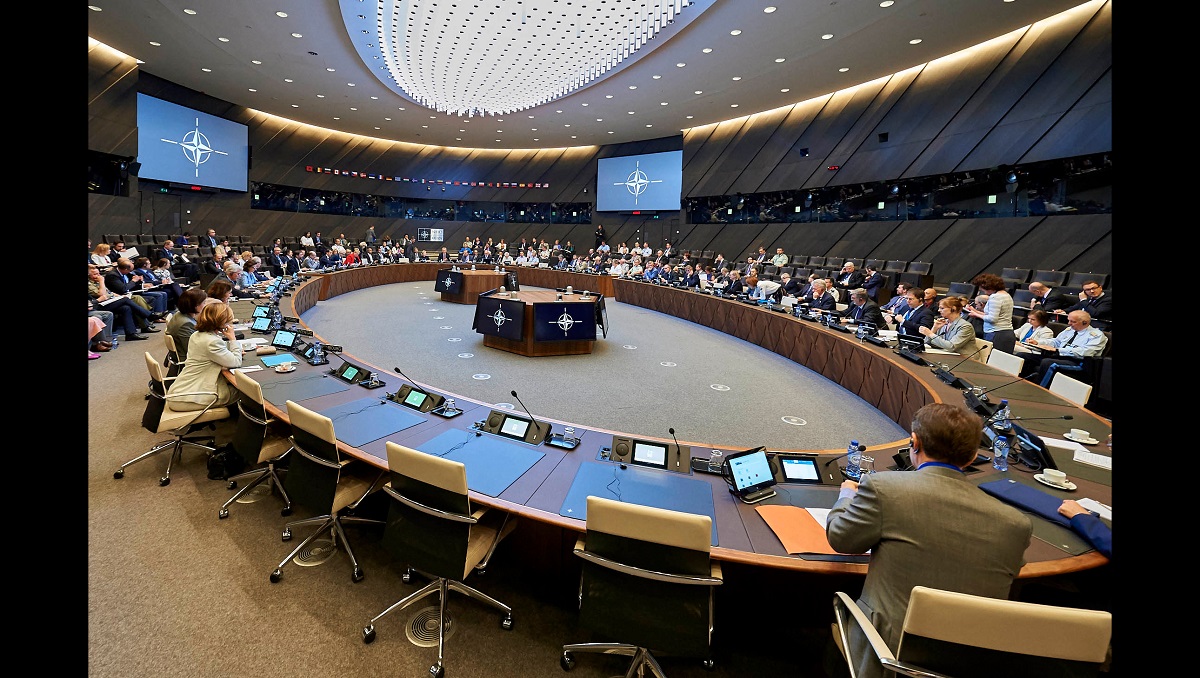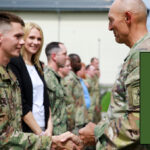
“There is only one thing worse than fighting with allies, and that is fighting without them”
―Winston Churchill
How much do you know about working in NATO (as opposed to what you’ve just heard it is like)? Maybe you are interested in an assignment in NATO (and in the spirit of openness and honesty, I will admit up front that it is not for everyone), or perhaps you’ve been told you are going. Regardless of which one it is, I can guarantee you (having served for just under three years in Headquarters Allied Land Command), that with a little bit of prior preparation, you’ll grow as an individual and staff officer during your assignment, and you might even find out that you really like it!
If you do nothing else, understand that NATO is a completely coalition/multinational environment. The alliance has a wide array of types of headquarters and organizations: political, strategic, operational command, and its own force structure, too. Regardless of which part of the alliance that you find yourself in, however, you’ll almost always be operating in a joint, civilian and coalition environment, and will most likely be living as a guest in someone else’s country too. All of this comes with some great opportunities (personally and professionally), but common bedfellows of opportunity are challenges and potential pitfalls.
Allow me to start by setting the scene at the macro level using stories and imagery, before offering some advice on how to navigate the environment. Think of NATO as a big family that has grown over the years, through births and marriages, either steadily, or with real spurts, and sometimes in a surprising or unexpected way. Consequently, there’s a lot of history, some issues, and maybe the odd “falling out,” too. View the grandparents as the old states formed years ago (or those who first joined the alliance) and the parents and children as either relatively newly formed states, new democracies, or those who’ve recently joined.
Now imagine it’s just after a huge Thanksgiving Dinner: the plates are empty, stomachs are full. Family tradition dictates that the whole extended family now sits down together to watch a movie. But here’s the rub—years ago it was decided that the film can only be chosen by achieving complete consensus, with every family member having an equal vote, regardless of their age, views, or level of investment in the family over the years. So, the debate begins. Grandma wants an old black and white movie, Grandad likes Westerns. Dad prefers Sci-Fi (Mum rolls her eyes at this). The teenagers do not offer any options but are vociferous in their disdain of every movie mentioned by others. And then there are the 5-year-olds… Well, you know how that works out. Yet somehow, complete consensus must be found. It takes time, a lot of reasoning, some concessions and maybe a novel approach, too (which may condemn the family tradition to the trash and see everyone just watch whatever they want on their ‘phones but all sat together in the living room).
I am not saying that this is NATO. But there are certainly parallels. Every nation has an equal vote, regardless of how long it has been in the “club,” how big or small it is, and regardless of having met the 2% of GDP spending on defense “target.” Politics also plays its part, sometimes obviously, other times less so. There are agendas and “alliances within the alliance” (don’t let anyone tell you otherwise). Some open and obvious, others more hidden from view. There is also the ever-present threat of a clash of cultures; after all, we are dealing with 32 countries spread from Asia through Europe to North America, so one should expect nothing less.
But trust me when I say that you can navigate these rapids and ensure you enjoy a really rewarding assignment, just think about the following topics.
Adapt to working in NATO.
Understand NATO as a whole, and where your organization sits in it all. Learn its language, and never assume your country’s definition is the NATO definition. Understand both NATO’s processes (they will be different to what you have experienced prior) and the other nations’ processes too. Question (politely) those that seem a little odd, as too often there are “ghost rules,” misinterpretations of facts, or people being out of date with policy, and accept those that are in date.
Learn to deal with frustrations.
I guarantee you’ll experience frustrations during your time in NATO. Some are simply an inevitable part of being assigned to a multinational organization, others originate from dealing with foreign nations, and some from your own country’s processes having to work in an unusual context. Whatever the source, remain outwardly calm, and never get angry.
Work hard on being a team player.
If you want to go fast, go alone; if you want to go far, then go together. Your job, as a leader and a follower, is to maximize the output of your team, whether that team is your section, branch, division, national contingent, or headquarters. You are part of it. So be an active team member who always adds value. But remember that as a native English speaker you have a real advantage in dealing in your own language, so always make allowances for those working in their second, third, or fourth language for hours on end, day in and day out.
Understand the “Blue Force battlespace.”
Work hard to understand other nations’ different terms and conditions of service (in terms of money, allowances, time away on Temporary Duty (TDY), time off in lieu/compensation, number of holidays per year, etc.). Identify which nations impose additional caveats (e.g., no more than two weeks of TDY per person per year, or no TDY outside of the host country), and take into account an individual’s experience, training, and culture. Remember that the US military education system is first rate, and there will be many who lack the benefit of your military training and or experience. If in doubt, track down the relevant Senior National Representative (SNR)—every nation in the headquarters will have one, and they are a great start point to check something out. Try not to compare it all too much—I’ve seen many do so and become upset when it appears someone else has “more” than them. Do remember that in many cases, the constraints are national laws which cannot be broken in peacetime.
Communicate to be understood.
Native speakers speak fast. Don’t. Speak clearly and a little slower than you normally would (but don’t be insulting). Use simple but exact language, use active voice, and include regular pauses. Invite confirmation of understanding (a message sent is not always a message received). Never hide behind cleverly designed sentences, and avoid double negatives, nuance, idioms, etc. Tailor examples to your audience (noting you may have up to 32 countries listening). Re-read all your emails before sending and assume that an ambiguity will result in a misunderstanding. Finally, think before reverting to the formats and procedures of your service (as opposed to using NATO’s processes); yes, it may be quicker for you initially, but it risks confusion.
Go out of your way to help others.
As a US service person and a native English speaker, expect to be asked to help other with their written work, to give advice on presentations, or to be asked for your views on how to solve a problem. It will take up some of your time, but unless it stops you meeting a hard deadline, accept it, be honored that they have asked you, lean in, and help. Do not become someone who hides behind their job specification as a reason not to help.
Be the master of your job.
Make sure you are trained to your job specification; are up to date in your knowledge (both in your own country’s doctrine and ideally NATO’s doctrine too); know and live the standards expected of you, and ensure you do the basics to an excellent level.
Do as you ought, not as you want.
Expectations of US servicemembers will be rightly set high. Make sure that everything you do supports your nation being viewed as the leading ally in NATO. Ensure your actions do no harm, remain humble, and always seek to advance your reputation, as a nation, an armed force, and a contingent.
Think to the finish in everything you do.
Today’s decisions are either tomorrow’s freedoms or constraints. But this really is true in NATO. So, think deeply and broadly before you act, always consider second- and third-order effects, try and identify the unintended consequences, work out who else needs to know about the issue, and seek advice if required. Never rush a decision simply for ease.
Keep a Positive Mindset.
“Light a candle rather than curse the darkness”: go out of your way to identify and implement solutions, be proactive to fix issues before they become problems, and do not let inertia become the norm. (Re)read a Message to Garcia.
Take time to build relationships.
They say that “you can’t surge relationships or trust.” It’s true. So spend time building these. It requires time and effort but will reap rewards. Find the time to walk the corridors, chat to people (and not just about work), build your network, and join the dots.
Be a good guest in the country you are in.
And finally, always remember you are a guest in someone else’s country. Be the exemplary visitor: keep an open mind to the local culture(s), have a go at learning the language, explore the country, learn and respect the customs. Yes, most of what I’ve written here is “Motherhood and Apple Pie.” But after three years of working in NATO I think these points are worth stressing. Let me wrap up by saying that I loved my time in NATO. I won’t lie, there were frustrations, but there are in any job. I learned loads, got work with some amazing people, and maybe even moved the ball just a little further down the field. So go on, apply for that NATO billet. You’ll get to see a whole new world and be part of the most successful alliance in modern history, and all during a time of real change and relevance.
The views expressed in this article are those of the author and do not necessarily reflect those of the U.S. Army War College, the U.S. Army, or the Department of Defense.
Paul Blakesley is the British Army’s LNO to HQ USAREUR-AF. An infantryman by trade, his previous appointment was ACOS G3 Operations in NATO’s HQ Allied Land Command in Izmir, Türkiye (2020-23). He served prior as an instructor at the Kuwait Armed Forces’ Command and Staff College. An economist by education (Bristol and Warwick Universities), he is a graduate of U.S. Command and General Staff College (CGSC) and School of Advanced Military Studies (SAMS).
Photo Description: The first Council meeting in the new Room 1 conference chamber with Allied Ambassador.
Photo Credit: North Atlantic Treaty Organization photostream




